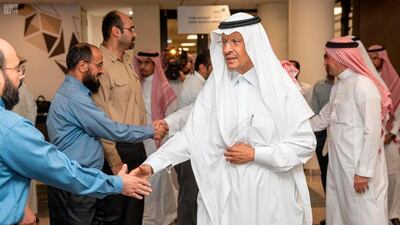Saudi Arabia signed an agreement with Jordan to develop a 164-kilometre electricity grid between the two countries.
Riyadh and Amman have undertaken a comprehensive study to evaluate the feasibility of the project, according to a statement in Saudi Arabia's state news agency SPA.
The development of an electricity grid between the two countries was part of the kingdom’s Vision 2030, Saudi Arabia's energy minister Prince Abdulaziz bin Salman said.
“There are promising opportunities from the project to support the reliability of the electrical networks between the two countries, achieve economic savings, [enable] electrical networks to enter renewable energy and achieve optimal investments in electricity generation projects,” he said.
After the feasibility studies, the two sides agreed to link Qurayyat in Saudi Arabia with East Amman in Jordan.
Saudi Arabia is also exploring plans to export renewable energy through the planned link.
The kingdom is developing its first wind power plant – a 300MW project – in the north-western Al Jouf region, which borders Jordan.
Riyadh expects to account for about half of the region’s wind capacity additions by 2028.
Jordan is currently carrying out a three-year programme to overhaul its public debt, which reached a record 94 per cent of its gross domestic product in 2019.
To structure its finances, the country needs to reduce its energy import bill.
Jordan, which imports over 94 per cent of its energy needs, is looking to diversify its grid by incorporating solar and wind into its energy mix.
Around 285MW of wind and 771MW of wind and solar power capacity were integrated into its grid last year.
Amman plans to raise its renewable capacity to 2.7 gigawatts by 2021.
Jordan follows Iraq in plugging into the GCC's interconnection grid to meet its own supply shortfalls.
Baghdad signed an agreement in 2019 for a transmission line that would allow it to import 500MW of electricity from the GCC.
Iraq plans to import electricity through a 300km transmission line that would connect Kuwait to its port in Faw. The project will be funded by the GCC.
Opec's second largest producer also imports electricity from its neighbour Iran.


